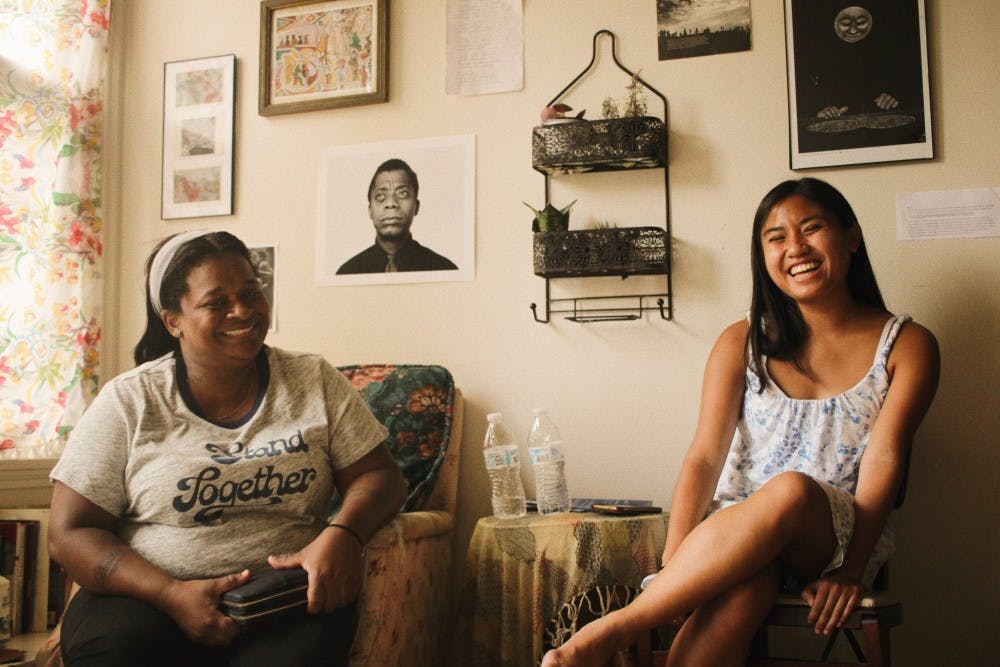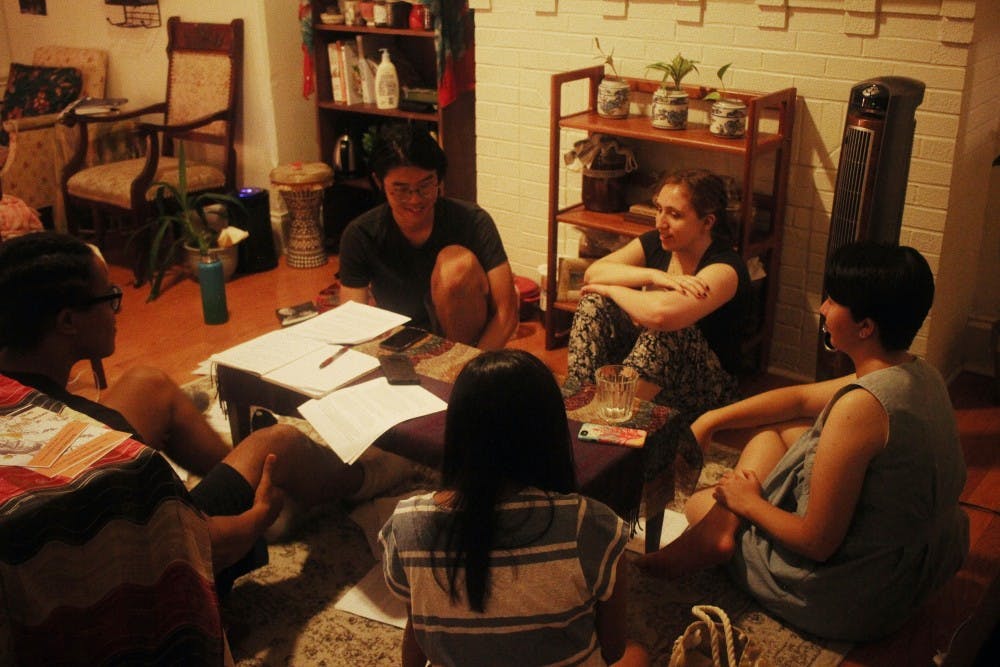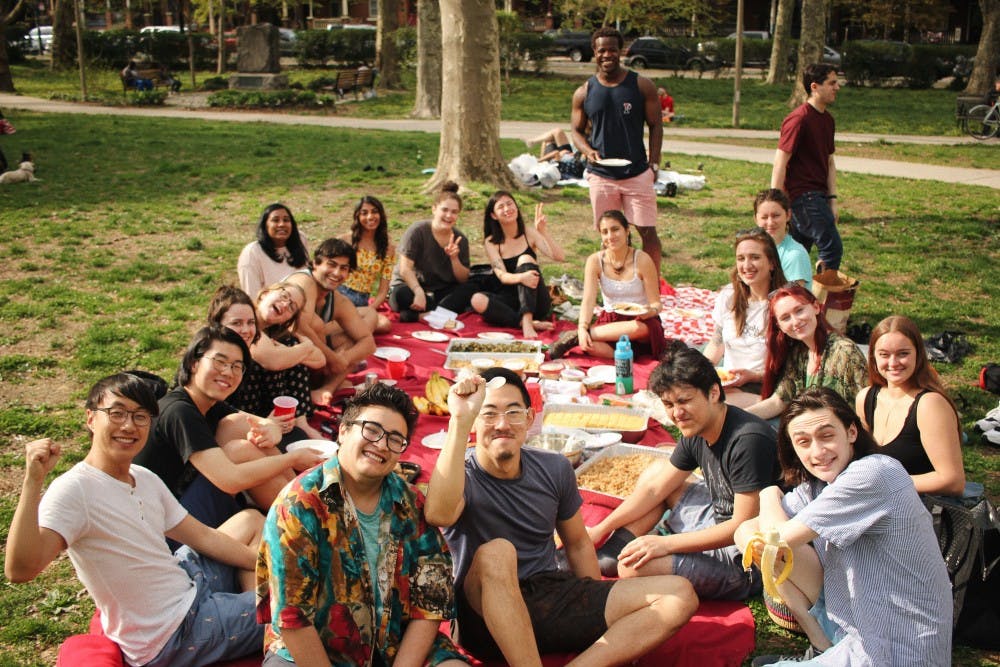Penn SLAP—or Penn Student Labor Action Project—aims to turn issues they are passionate about into movements. This past semester, the group has been "reborn" after a hiatus. Even with a long summer interrupting their correspondence, they have no plans of slowing down. Their commitment to social justice and advocacy, combined with compassion and empathy, proves that SLAP is back and better than ever.
When Caleb Chen (C‘21) and Michelle Lyu, who's graduating in December 2019, talk about the work they’ve done as organizers of SLAP, their passion for advocacy and education is tangible. Their genuine excitement drowns out all background noise in Franklin’s Table. Our conversation spans important topics from wages to healthcare and activism. Nothing was off the table.
Michelle described SLAP as “a collective student worker movement that was restarted a few months ago by a group of students and workers on campus…centered around the theme of creating a better world specifically rooted in the student and worker struggle.” Caleb added, “I think what differentiates us is the idea of individual transformation that feeds into structural transformation. So it’s not just focused on labor action. We’re actually understanding the history and the ideas surrounding labor and fighting for a better world…we want to understand not just the present moment but the historical movement.”
What SLAP started from is slightly more complex. Since the early 2000s, there have been several iterations of SLAP, focused on different issues and struggles facing workers on campus—both directly and indirectly. Michelle explained that this is a common trend with student organizing, “There are peaks and lulls…From what I understand, the last iteration of SLAP was focused on the PILOTs campaign, trying to get Penn to pay property taxes, and the iteration before that is what helped the dining workers on campus unionize in the first place.”
This new iteration started with a worker at Falk Dining Hall at Hillel approaching Michelle, telling her about the issues that they were experiencing, and asking if Penn Student Power would be interested in showing solidarity with them. What came about was a coalition of over 10 student groups protesting in February of 2019, which ultimately fed SLAP the momentum it needed to restart. At the end of March, it was decided that SLAP would officially begin working towards enriching the movement that had risen to the surface in past months and tackling issues the workers face: inadequate low–cost healthcare, unlivable wages, long hours, sexual harassment, racism, and general disrespect.

A SLAP member doing a video interview with a worker's wife. (Cred. Michelle Lyu)
Even with the hefty issues previous iterations have taken on and won (the most notable example being the unionization of the dining workers), Michelle and Caleb note that the work SLAP is doing now differs from past iterations. They’re no longer working on making sure Penn pays property taxes—now that's being watched by Penn Student Power. Additionally, SLAP is now focusing more on educating and building personal connections, which means getting to really know the people they’re advocating for.
Michelle and Caleb talk about how both workers and members of previous iterations on campus have noticed the differences between the old and the new iterations of SLAP. While the differences lie in the specific issues and the education aspect, perhaps the most notable change is the difference in personal relationships with workers. Caleb emphasized the difference, saying “The most formative and fulfilling moments during SLAP are when we get to talk to the workers not just about their grievances but about their day, what they’re feeling, what their aspirations are, and building relationships that are more meaningful than just, we’re here to fight for you. We’re here to fight with you hand in hand.” Michelle added, “I think what it is is having the work that we do be rooted in humanity at the end of the day. The humanity of the students, the humanity of the workers, seeing people as fuller, deeper humans than just another number or another organizer, another activist, another oppressed, exploited worker. It’s so much deeper than that.”
This summer, members have been meeting around once a week to slowly make their way through labor–focused literature. Both Caleb and Michelle have noted that the summer has helped SLAP deepen as an organization through education. Using the autobiography of the Chinese-American revolutionary Grace Lee Boggs as their text, the group brings up questions about past labor movements and how they can learn from their triumphs and failures. This helps them make informed decisions about SLAP’s future. They are excited to continue studying together. It’s something that they’ve started this summer, but want to continue to implement as a group with the fall semester through reading the works of great literary figures involved in labor movements.

A summer reading collective meeting. (Cred. Michelle Lyu)
SLAP isn’t just another advocacy group criticizing the University’s administration. It aims to unite students and workers, educate members of the Penn community on the injustices perpetrated against workers on campus, and promote kinship between the often fragmented students and workers. Whether it’s fundraising to give a worker her first vacation ever for her birthday, organizing a protest, or even a potluck, SLAP is truly a community for all. Michelle said, “It really, really moves me because it felt like a movement I’d been searching for during my prior three years at Penn and could not find anywhere around me. I’d never seen so much camaraderie amongst the student body before, and so much kinship and sincerity, and honest community. I’d just never seen anything like it.”
*An earlier version of this article stated that Michelle Lyu graduated in December 2020 instead of December 2019. 34th Street regrets this error.

